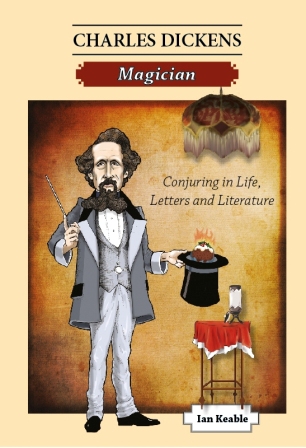The Century of Deception: The Birth of the Hoax in Eighteenth-Century England

Book Synopsis
In 1749, a newspaper advertisement appeared declaring that a man would climb inside a bottle on the stage of a London theatre. Although the crowds turned up in their hundreds to witness the trick, the performer didn’t. Over the following decades, elaborate jokes and fanciful tales would continue to bamboozle people across England.
In The Century of Deception, magician and historian Ian Keable tells the engrossing stories of these eighteenth-century hoaxes and those who were duped by them. The English public were hoodwinked time and time again, swallowing whole tales of rapping ghosts, a woman who gave birth to rabbits, a levitating Frenchman in a Chinese Temple and outrageous astrological predictions. Not only were the hoaxes widely influential, drawing in celebrities such as Samuel Johnson, Benjamin Franklin and Jonathan Swift, they also inflamed concerns about ‛English credulity’.
‘Fake news’, ‛going viral’ and ‛social media’ may be modern terms, but as this entertaining, eye-opening book shows, these concepts have been with us for centuries.
The Hoaxes
The ten main chapters concentrate on a number of individual hoaxes, with particular emphasis on the motivation of the hoaxer and why people were caught out by them. The ten hoaxes are as follows:
- A man pretending to be from Formosa (now Taiwan) and writing a book all about the island and its people;
- Jonathan Swift hoaxing an astrologer by predicting his death;
- Mary Toft claiming she gave birth to 17 rabbits;
- Benjamin Franklin concocting a fictitious speech of a woman accused of having children out of wedlock;
- An advertisement saying a man would climb inside a bottle on the stage of a London theatre;
- Elizabeth Canning stating she was kidnapped and had survived for 28 days without sustenance;
- The Cock Lane Ghost accusing a man of murder;
- A balloonist obtaining money to witness his failed flight;
- A maid wrecking havoc with household objects under the guise of a poltergeist;
- William-Henry Ireland 'discovering' a new Shakespeare play that went onto be staged.
About the Author
Ian Keable obtained a first class degree from Oxford University, qualified as a Chartered Accountant and then became a professional magician. He now divides his time between performing magic; giving talks on topics ranging from James Gillray, the first political cartoonist, to David Devant, the first President of The Magic Circle; and researching and writing. His previous books include Stand-Up: A Professional Guide to Comedy Magic and Charles Dickens Magician: Conjuring in Life, Letters and Literature.
Publication Details
The book was published by The Westbourne Press on 7 September 2021. Hardcover, 320 pages with 28 images. Please check out The Century of Deception for more details of how to buy the book.
If you would an inscribed copy, please contact me direct at my email: ian@iankeable.co.uk
Charles Dickens Magician: Conjuring in Life, Letters and Literature
 Book Synopsis
Book Synopsis
Everybody knows Charles Dickens as an unsurpassed writer; many know him as a superb public reader of his own works; some know him as a talented actor; but very few know that he was also a conjurer. Up to now this knowledge has been rather hidden away in biographies, with academics considering it of little significance. For the first time Dickens's journey to a conjurer has been properly researched and narrated: using his own letters and other contemporary reports, the evolution of the novelist to enthusiastic performer is plotted.
What is particularly unique about this book is that Ian Keable brings his own experiences as a magic historian and professional magician to branch out into related subjects. Who were the conjurers that inspired Dickens? Which tricks did he do? Where did he get them from? What were his strengths and weaknesses as a conjurer? Why did he stop? Which of his contemporaries did he rate the best? Did his interest in conjuring impact upon his writing? In answering these questions, much is revealed about the world of Victorian conjuring and indeed magic generally.
It is unfortunate that many claims in the past have been made about Dickens relating to conjuring which have proved questionable: readers might be surprised by just how many errors have been perpetuated over the years. This book seeks to dispel those myths. But, in the process of disentanglement, new facts and insights emerge which prove equally intriguing about the man and his magic.
Rarely does a book merge two such endlessly fascinating subjects as magic and Charles Dickens into one. If you have even the remotest interest in either, Charles Dickens Magician is for you.
Why of Interest to Magicians?
- Highlights a brilliant, but largely forgotten, mind reader, who Dickens saw; he described his act in great detail.
- Answers finally the question of whether Dickens really saw the great French magician Robert-Houdin.
- Puts into historical perspective the juxtaposition of the street entertainer and the theatre conjurer.
- Corrects many errors about Dickens's conjuring perpetuated by previous magic historians.
- Analyses Dickens's tricks that he did - many of which could easily be performed with great success today.
Why of Interest to Dickensians?
- Shows how Dickens's approach to conjuring mirrors his personality in other areas of his life.
- Illustrates how Dickens dropped magic similes and metaphors into his novels.
- Argues that several key scenes in A Christmas Carol were heavily influenced by his knowledge of conjuring.
- Reveals the significance of conjuring in Dickens's life and how it impacted on his attitude to Spiritualism.
- Uncovers the extent of his magical writings in his two weekly journals Household Words and All the Year Round.
Book Details
Please email me if you are interested in buying the paperback edition of this book. The hard back has now sold out.
